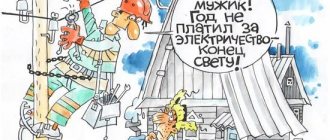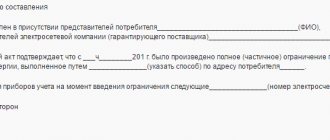Hot and cold water is turned off for several reasons, one of which is debts to pay for utilities. The current situation is such that citizens have more and more reasons to fall into the category of insolvent tenants. Therefore, the question of the powers of public utilities and debtors is relevant.
Legal requirements for the procedure
The provision of housing and communal services to citizens is regulated by the Rules approved by Decree of the Government of the Russian Federation No. 354 of 05/06/2011. According to this document, the supplier may suspend or limit the provision of services after sending a preliminary notification to the debtor.
The consumer must be familiar with the warning 30 days before the expected sanctions.
The grounds for suspension of the service are considered to be:
- Non-payment within three months.
- Incomplete payment for the same period after receiving notification from the supplier.
- Violation of the debt repayment agreement concluded between the debtor and the supplier.
The same document states that, according to sanitary standards, it is prohibited to suspend the supply:
- cold water;
- heating;
- gas intended for heating;
- sewerage.
Without them, the premises automatically become unfit for habitation, therefore, the Housing Code of the Russian Federation is violated. A direct ban on turning off cold water and heating is contained in paragraph 307 of the Decree of the Government of the Russian Federation.
Utilities have the right to turn off:
- hot water;
- electricity;
- intercom;
- gas intended for cooking.
Procedure for turning off water for non-payment
Restriction of water supply to the defaulter is carried out in the following order:
- The debtor is sent a notice of the expected suspension of water supply if the debt is not paid within 30 days. The warning is delivered by registered mail or handed to the addressee against a signature (read more about the rules for drawing up various documents about turning off water here).
A properly drafted warning should contain the following points::- full name of the debtor;
residential address;
- account number;
- debt period;
- amount of debt;
- debt repayment date.
- If the debt is not repaid within the allotted time, the service provider will limit it, if such a technical possibility exists. The management company is obliged to additionally warn the consumer 3 days before the proposed actions.
- The utility supply restriction is in effect for 30 days . If the debtor does not take action to pay the debt within the allotted time, the utility service is turned off.
- Suspension of water supply does not mean that the debtor may not pay the resulting debt. The supplier has the right to recover funds through the court.
Warning about turning off water for non-payment, sample
Working with debtors to pay utility bills
Let's start with the fact that paying for utilities is the current responsibility of those citizens who use government resources: water, electricity, gas, heat. For those who live in a dense forest, in a makeshift hut without heat, water and light, you don’t need to read further, the issue of resource provision has not affected you. And the obligation of everyone else to pay every month for the consumption of all these components of modern comfort. Without any alternatives.
People who refuse to pay utility bills for more than 3 months are given the “title” of debtor. How honorable it is, decide for yourself. And I’ll tell you how problematic it is.
From the moment the new status appears, work begins in relation to the “problem” apartment. Already from the second month of late payment, penalties begin to be charged, about writing off penalties for utilities using the link. The accrual of penalties for late utility payments is permitted by Article 155 of the RF Housing Code, clause 14. Penalties are accrued for each day of delay, their amount depends on the number of months that were unpaid. So, from the second to the third month, the percentage of penalties is 1/300 of the Central Bank refinancing rate, starting from the fourth month - it rises to 1/130. I never tire of repeating that not paying for utilities is not a solution at all, it’s rather an elevator into a huge abyss of problems that you didn’t even suspect about before.
If the reason for your debt is the inadequate quality of utilities, it is much cheaper to pay for them and then record the poor quality of services. There are very specific evaluation criteria. You can order an examination and receive a document stating that:
- the water is not hot or clean enough;
- pressure is outside the norm;
- The batteries are cold or the lights are turned off too often.
Through the court, you can achieve not only a recalculation, but also compensation for additional losses. And if the debt accumulates, the losses will only grow, no one will make any recalculation, moreover, you will pay not only the amount of the debt, penalties, but also fines - the amount can be huge. It is better to analyze a lawsuit for non-payment of utilities with our housing lawyer so that losses are minimal.
How is it done?
Restriction or suspension of the supply of utility services is possible only if these actions do not cause inconvenience to other owners of the premises and do not create a threat of harm to the common property of the apartment building.
Turning off hot water for non-payment in a separate apartment is carried out by shutting off or welding the pipes . Often, defaulting owners try to prevent utility workers from allowing them into the apartment. But such a position can lead to additional expenses.
Non-payers can install a plug on the water supply pipe from the basement of the apartment building using a special device. This manipulation is carried out for a certain cost, which managers also collect from the debtor.
As a result, the owner will have to pay the arrears in utility payments, late fees, and the cost of installing and subsequently removing the plug from the pipe.
IMPORTANT .
Non-payment within 3 months must be in full. If during the specified period the owner of the premises paid at least one ruble for water supply, disconnection for debts will be considered illegal.
Stopping the DHW supply without warning
The country's legal acts provide for turning off hot water supply without first informing residents of a private or apartment building.
Such cases are due to the following factors:
- emergency situations, natural disasters, if what happens threatens the life or health of residents of the house or others;
- the likelihood of such situations arising with further danger to citizens.
The last factor may include an impending accident at the boiler house of the microdistrict.
Turning off hot water is also provided for in other cases, without advance notice to the individual consumer.
The following situations are included in this category:
- unauthorized connection of the client to the water supply pipe;
- communication in the user’s apartment is in an emergency or faulty condition;
- creation of an emergency by the owner of the property;
- requirement of authorized organizations;
- illegal modification by the owner of communication structures.
The latter case includes equipping the bathroom with a heated floor from the hot water supply network.
Other conditions not listed are subject to prior notification to the client before disconnection. If a resource supply company violates regulations, a citizen has the right to appeal to the court.
Actions of the debtor in case of illegal disconnection
If a citizen believes that the water supply was turned off by suppliers illegally, he must act as follows:
- Send a written application to the management company with a request to restore the water supply and recalculate for the period of shutdown.
- If water does not appear in the apartment within three days, a claim is filed to be sent to Rospotrebnadzor and the Prosecutor's Office. A copy of the statement sent to the management company is attached to the claim.
The owner of the premises may also file a claim in court.
The claim is accompanied by photos and videos confirming the lack of utilities in the apartment, as well as witness statements.
Effective evidence is an inspection report drawn up in the presence of two witnesses.
You can find out more about where to complain about illegal shutdown of hot water and heating here.
What is temporary resource overlap?
If there is an accident on the network, utility workers must shut off the water to carry out repair work. This procedure is temporary, and everything returns to its original position as soon as the problems are resolved.
If there is a leak inside the apartment, then a shut-off valve can be used for this purpose. And then water will not flow into this particular room. If damage is detected on the pipes that lead water to the apartment, then it becomes necessary to turn off the water supply at the common valve in the house. It is installed at the water meter. In such a situation, all apartments located on a particular riser find themselves without water.
How to make a claim and complaint?
There are no unified forms for drawing up claims and complaints, so they are drawn up according to the general rules for drawing up business papers:
- The management company's claim is drawn up in the name of its director. The document contains the following points:
- name of company;
personal data of the applicant (full name, address, contacts);
- the essence of the claim with references to the norms of law. In this paragraph, it is necessary to indicate the illegality of disconnection due to lack of notification or partial payment;
- the requirement to restore the supply of utility services within a specific time frame and recalculate payments for the period of shutdown;
- date and signature.
- A complaint to the Housing Inspectorate or the Prosecutor's Office is filed after receiving a negative response from the Criminal Code or when the consumer's requirements are completely ignored. It is drawn up in the name of the head of the organization and includes items:
- name of company;
personal data of the applicant;
- description of the circumstances of the case indicating the fact of illegal water shutoff. This paragraph describes filing a claim with the Criminal Code and reports the content of the organization’s response;
- please evaluate the actions of the management company’s employees;
- date and signature.
- A statement of claim is filed in court after receiving a response from the regulatory authorities. provided that the problem has not been solved or if it is possible to prove the moral damage caused by the shutdown. Such cases are within the jurisdiction of district courts, so you need to contact this organization.
The document is drawn up according to general rules and includes points:- name of the judicial authority;
plaintiff's details: full name, residential address, telephone number;
- details of the defendant: full name of the management company, full name of the director, legal address, telephone number;
- statement of claims. This paragraph describes the circumstances of turning off the water supply, the date of filing a claim with the Criminal Code and the content of the response. You can also describe the circumstances of contacting regulatory authorities. Your own claims must be supported by references to the violated norms of the law;
- We request that it be illegal to turn off the water supply based on current legislation.
The claim must be accompanied by a receipt for payment of the invoice (if available).
Sample complaint from the management company about turning off hot water.
Attached to the complaint is a copy of the complaint sent to the Criminal Code and the response received from it.
Attached to the statement of claim are copies of the claim to the Criminal Code and the complaint to the regulatory authorities, as well as the responses received from these organizations.
IMPORTANT . The outcome of the case when going to court directly depends on the correctness of the statement of claim. Therefore, it is more advisable to seek help in its preparation from a qualified lawyer.
Responsibility of the management company for illegal disconnection
The law provides for liability of suppliers for illegally turning off water:
- Administrative liability - a fine of 500 to 1,000 rubles for officials and from 5,000 to 10,000 rubles for legal entities.
This measure is applied by regulatory authorities if violations are established (Article 19.1 of the Code of Administrative Offenses). - Criminal liability is established by the court in the event of material or moral harm being caused to the owner.
The act carries a fine of up to 200,000 rubles and imprisonment of up to 3 years.If a person’s death occurs as a result of illegal actions, imprisonment is possible for up to 5 years. In addition, a ban is imposed on the right to hold leadership positions for three years.
- Arbitrariness is punishable by a fine of 80 thousand rubles (or in the amount of six months' salary) or forced labor for up to 200 hours.
If there are threats against the debtor, arrest for up to six months is applied. In exceptional cases, the court increases the term to 5 years (Article 330.215 of the Criminal Code).
If the disconnection is declared illegal due to lack of notification, the debtor receives a paper and is given a 30-day period to repay the debt. You will have to pay the bills anyway.
The illegally turned off water supply must be restored within three days, and payments must be recalculated.
Extenuating circumstances
In a private home, cold water may not be turned off under a number of circumstances.
Among them:
- the resident’s documented difficult financial situation, due to which he could not pay utility bills on time;
- a confirmed fact of a delay in wages at work for the debtor tenant, which allows you to count on installments;
- a minor or disabled person living with the debtor;
- documented problems the consumer has with employment;
- the debtor has a difficult financial situation due to objective reasons.
A mitigating factor is also the condition of the house in which the debtor lives. If a disconnection could lead the house to a condition unsuitable for normal living, then the management company does not have the right to do this even if there is a large debt.
Methods for filing a claim with the Criminal Code and response deadlines
A claim to the management company for illegal shutdown of water supply can be submitted to the responsible employee or sent to the organization by registered mail with notification. When submitted in person, the claim is drawn up in two copies . The receiving employee must sign and date the copy remaining with the applicant.
A response from the management company must be received within 10 days from the date of receipt of the claim. A response to a complaint to Rospotrebnadzor, the Housing Inspectorate or the prosecutor's office must follow within 30 days. If organizations violate the deadlines for taking measures, the consumer should file a claim in court.
The consumer is obliged to pay for the services provided to him in a timely manner and in the proper amount, so that the management company does not have grounds for turning off their water. If managers exceed their authority and turn off the water illegally, it is worth calling them to account and restoring their own consumer rights.











